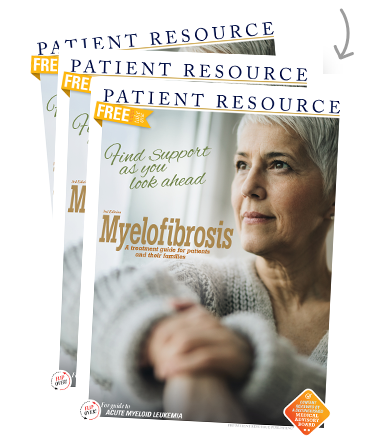Myelofibrosis
For the Caregiver
Stepping into the role of a caregiver may have been unexpected, but your support and dedicated efforts can make your loved one’s myelofibrosis diagnosis more bearable. You may take on a variety of tasks and handle different responsibilities. Following are some suggestions for how you can contribute to your loved one’s quality of life.
Empower your loved one to ask questions. He or she may feel afraid or unsure of speaking up and asking questions and may rely on your encouragement to learn about the disease and its treatment options.
Discuss concerns you both have before an appointment. Write a list of questions to share with the medical team.
Attend and participate in appointments. Telehealth appointments might be offered due to some centers having COVID-19 restrictions. You may be able to offer valuable information and insights about your loved one at appointments.
Track medications. Cancer medications are most effective when taken exactly as prescribed. Help your loved one stay on schedule with medications taken at home and those given at medical appointments. Use a calendar or reminder tool.
Encourage your loved one to share feelings and concerns. This may help you stay alert to physical and emotional changes that you can share with the medical team.
Learn what symptoms require a call to the doctor. Pay attention to changes such as fever, night sweats, bruising, weight loss or not eating.
Reduce the risk of infection. Myelofibrosis affects a person’s blood counts and may make them susceptible to infections. Do your part by encouraging social distancing and wearing masks. Consider getting the COVID-19 vaccine to further protect your loved one.
Shop, cook and provide personal assistance and transportation. Side effects, such as fatigue, may prevent your loved one from taking care of these and other daily tasks.
Manage expectations. Don’t feel pressure to get every question answered at a visit. Consider using email and portal systems between appointments. Also try to attend follow-ups with medical staff to close loops.
Take care of yourself. Rest, eat right, exercise and keep your own medical appointments to help you better care for your loved one.



